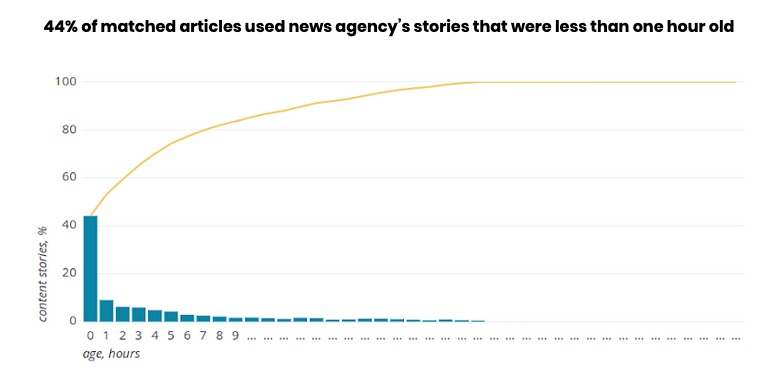How quickly do publishers pick up your stories and exactly how long is the tail of content published by news agencies?
At EzyInsights we track a great number of stories published by news agencies across the globe. We track even more stories by news media and other publishers that quote and replicate news agencies’ stories.
We studied this massive data sample to see if there’s an overall trend for how quickly news agencies’ stories get picked up.
To identify matches, we looked at articles that included two or more full sentences taken verbatim from the news agency’s original text. If a published story consisted of 10 sentences, at least two had to match a news agency’s text. That threshold is high enough to discard any accidental matches, but low enough to give the agency credit for quoted content.
With that in mind, we discovered that 17% of new agency’s stories get picked up within the first hour of their release. That number goes up to 57% by the 6th hour, and 99.5% of all the articles that quote the news agency story are published within 24 hours of the newswire release.
Based on this data, news agency’s stories that do get picked up, do so very quickly after their publication. If your story didn’t get traction within the first five hours, it is not likely to get more traction down the line.
To test this hypothesis, we looked at our data from another angle – by looking at stories released by publishers that quote or reproduce news agency’s content.
If a publisher quotes a news agency’s story, would that typically refer to fresh content or is there a long tail?
The pattern became even more clear: 44% of matched articles relied on news agency’s stories that were less than one hour old. 75% of matched articles relied on news agency’s stories that were published less than 5 hours ago, and 99.47% of all matches relied on stories that were published within the previous 23 hours.
In other words, if publishers pick up a news agency’s story, they do it right away.
What we can learn from this is that individual stories released by agencies have a lifespan of roughly 24 hours, with the vast majority of matches occurring already within the first five hours of publication.
Can you expect someone to quote your article two days or even a week from its release? Yes, but that would comprise less than 0.5% of all matches.
Yet again the data confirms the importance of speed: if a story is not delivering matches quickly, is it worth your resources to pursue it any further?
Or should you direct your journalists to follow-up on the story that’s bringing an unusually high number of matches within the first hour of its publication?
Editorial discretion is still needed to make this decision. But given the pace of online publishing, a digital newsroom needs real-time data to inform that decision.


